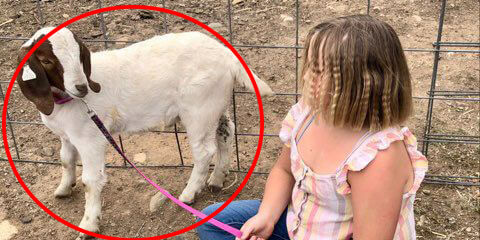Viral Story of Slaughtered Goat Reveals How 4-H Seeks to Desensitize Kids to Violence
This little goat went to slaughter, traumatizing the girl who had cared for him. The viral story of Cedar the goat, whose killing sparked a nationwide uproar, is showing people that 4-H and other youth agricultural programs promote speciesism and desensitize young people to violence. Most animals used as “projects” in these archaic programs end up on a trip to the slaughterhouse. The “lucky” ones spend the rest of their lives as breeding machines.

Young people who are interested in our fellow animals may gravitate toward programs like the National FFA Organization or 4-H. But these programs view animals as commodities, not as individuals with needs and desires of their own. Young people quickly learn that the cow, pig, sheep, or goat they take on will be either a “market” animal or a “breeding” animal. Cows fated to become meat are judged according to their “yield of the carcass.” Those destined to spend their lives producing milk are judged on their potential for “heavy production and a long period of usefulness.” The rabbit with a “well fleshed rump” will end up on a dinner plate.
4-H participants spend countless hours tending to their charges as best they can, learning everything about their personalities, quirks, likes, and dislikes. But at the end of the season, they must watch the animals they’ve bonded with and nurtured be sold off to the highest bidder.
Kids and teens are given the dangerous message that sending their animal friends off to endure a violent, terrifying death at the slaughterhouse is normal and routine. The disconnect is chilling. As one former 4-H member blithely put it, “I can honestly say I looked at it as … an opportunity to make some money. … The rewards are greater than the heartache.”
Learning kindness is crucial to the health and well-being of future generations.
Our natural affinity and respect for other animals should never be snuffed out to make room for a cold, uncaring attitude that would allow young people to abandon intelligent, social animals to be slaughtered.
As psychologist Dr. Aubrey H. Fine puts it, “Early life experiences seeing animals being treated fairly seems to have a positive impact [on] children and helps them in developing their moral character.”
It’s unfair both to animals and to young people when their trust is betrayed. Animals go from a familiar environment one day to a frightening and confusing experience the next, which only ends when a worker slits their throat. And young people who were tending to their animals’ needs and snuggling with them in the hay between showings watch as their beloved friends are taken away, never to be seen again.
But not all 4-H participants are cavalier about this grim outcome. When one 8-year-old sold her first “market” calf, she lamented, “His name was Justin, and he was my best friend. We went to the fair and I got a blue ribbon. When the reality of the fact that he had to go to market hit, it was awful.”
How to respect animals for who they are, instead of how humans can profit from them, is a lesson worth learning.
What You Can Do to Honor Cedar and Countless Other Animals
Did you know that you could save nearly 200 animals per year just by going vegan? That’s right—being vegan saves lives.
Getting started is easy! PETA’s vegan starter kit has everything from recipes and tips on eating out to health information:

